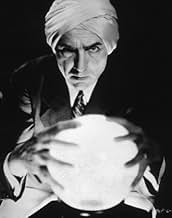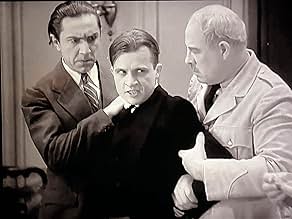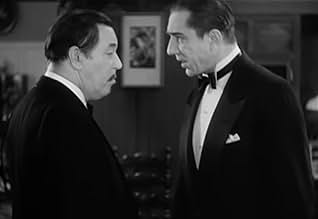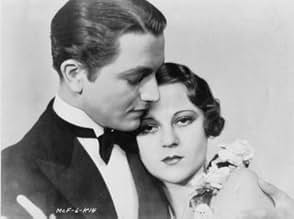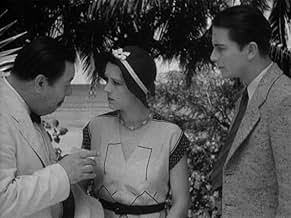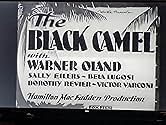IMDb-BEWERTUNG
6,6/10
1787
IHRE BEWERTUNG
Füge eine Handlung in deiner Sprache hinzuThe unsolved murder of a Hollywood actor several years earlier and an enigmatic psychic are the keys to help Charlie solve the Honolulu stabbing death of a beautiful actress.The unsolved murder of a Hollywood actor several years earlier and an enigmatic psychic are the keys to help Charlie solve the Honolulu stabbing death of a beautiful actress.The unsolved murder of a Hollywood actor several years earlier and an enigmatic psychic are the keys to help Charlie solve the Honolulu stabbing death of a beautiful actress.
Dwight Frye
- Jessop
- (Nicht genannt)
C. Henry Gordon
- Huntley Van Horn
- (Nicht genannt)
Robert Homans
- Chief of Police
- (Nicht genannt)
Hamilton MacFadden
- Val Martino
- (Nicht genannt)
Louise Mackintosh
- Housekeeper
- (Nicht genannt)
Empfohlene Bewertungen
The quality of the film isn't the best, the acting is stilted and over the top, but 1931's "The Black Camel," the earliest extant Charlie Chan featuring Warner Oland, makes for fun viewing. Charlie is on his home court of Hawaii, where an actress, Shelah Fane (Dorothy Revier) is found murdered after consulting a psychic (Bela Lugosi) about whether or not she should marry someone she has fallen in love with.
This is only the first murder; another one follows. On investigation, Charlie discovers a connection to the case with a previous Hollywood murder, which went unsolved.
It's an absolute riot to see Bela Lugosi as a psychic named Tarneverro whose real name is Arthur Mayo. Better yet is Robert Young, who looks like he's about 16, as Jimmy Bradshaw. Then there's this nut job (who at one point actually ran onto a scene and scared me), Otto Yamaoka, who plays Kashimo. Kashimo is the forerunner of Lee Chan and Birmingham the chauffeur but he's crazier than a coot with his flapping arms and explosive voice.
We also get a chance to see Charlie at home with his large family, admonishing his son: "Why are you always last in your class? Can't you find some other place?" Son: "They were all taken." This particular entry into the series is steeped in cinematic history: it is the only surviving film out of five films starring Warner Oland that were based on the novels of Earl Derr Biggers; and it was shot in Honolulu in 1931. Back then location shoots were a rarity. Also, Earl Derr Biggers visited the set in Honolulu with a copy of his 1929 novel and gave it to Chang Apana, the real-life Charlie Chan.
Definitely worth seeing, and a neat mystery. There is a gaping hole in the plot; see if you can find it.
The title is based on the saying: "Death is a black camel that kneels unbidden at every gate."
This is only the first murder; another one follows. On investigation, Charlie discovers a connection to the case with a previous Hollywood murder, which went unsolved.
It's an absolute riot to see Bela Lugosi as a psychic named Tarneverro whose real name is Arthur Mayo. Better yet is Robert Young, who looks like he's about 16, as Jimmy Bradshaw. Then there's this nut job (who at one point actually ran onto a scene and scared me), Otto Yamaoka, who plays Kashimo. Kashimo is the forerunner of Lee Chan and Birmingham the chauffeur but he's crazier than a coot with his flapping arms and explosive voice.
We also get a chance to see Charlie at home with his large family, admonishing his son: "Why are you always last in your class? Can't you find some other place?" Son: "They were all taken." This particular entry into the series is steeped in cinematic history: it is the only surviving film out of five films starring Warner Oland that were based on the novels of Earl Derr Biggers; and it was shot in Honolulu in 1931. Back then location shoots were a rarity. Also, Earl Derr Biggers visited the set in Honolulu with a copy of his 1929 novel and gave it to Chang Apana, the real-life Charlie Chan.
Definitely worth seeing, and a neat mystery. There is a gaping hole in the plot; see if you can find it.
The title is based on the saying: "Death is a black camel that kneels unbidden at every gate."
Hollywood star Shelah Fane is filming her latest movie in Honolulu, while keeping her name in the papers with her whirlwind romance to Alan Jaynes, traveling playboy. Shelah decides to send for her psychic consultant, Tarneverro, to advise her if marrying Jaynes is the right thing for her to do, but while consulting with him, Shelah hints of a murder she committed a few years earlier, one Denny Mayo. Later she is found dead by her friend Julie, and the case is turned over to Inspector Charlie Chan, who has to figure out the Denny Mayo connection to both Shelah and the murder suspect. Nice entry in the Chan series, helped immensely by the on location shooting in Hawaii. Even with Lugosi as Tarneverro (a suspect no doubt) the suspects do not really give any sinister or worth-a-closer-look performances here. Yamaoka is really annoying as Chan's bumbling assistant (the latter word used loosely) Kashimo. The main problem with the film is too many characters with their own story in a movie that can't quite crack the B movie mold. Later remade as Charlie Chan in Rio. Rating, based on B mysteries, 4.
The 2nd real Charlie Chan film, the earliest to survive of the 38 that Warner Oland and then Sidney Toler churned out over the next 16 years for Fox and Monogram. Pretty faithful to Earl Derr Bigger's book, this only suffers mildly from the echoey staginess associated with early talkies, with some erratic acting but also some lovely smoky visuals of "Honolulu".
A woman with a dark past is stabbed to death at a hotel - of course all of the guests along with the butler and maid are involved for Charlie to sort through and mull over. Unravelling the threads of the mystery Charlie proved his eyes had microscopic capabilities (wonder how much DNA fingerprinting would've slowed him down?) - and that he was one of those "very clever men able to bite pie without breaking crust". There's a beautiful scene with the entire Chan Clan at the breakfast table that's worth a look on it's own. It all runs delightfully true to form, the excellent polished cast playing up well, especially young Robert Young and Bela Lugosi.
I can't speak for everyone else of course but I still cherish the hope films 1/3/4/5 will one day be found for the additional 5 hours pleasure.
A woman with a dark past is stabbed to death at a hotel - of course all of the guests along with the butler and maid are involved for Charlie to sort through and mull over. Unravelling the threads of the mystery Charlie proved his eyes had microscopic capabilities (wonder how much DNA fingerprinting would've slowed him down?) - and that he was one of those "very clever men able to bite pie without breaking crust". There's a beautiful scene with the entire Chan Clan at the breakfast table that's worth a look on it's own. It all runs delightfully true to form, the excellent polished cast playing up well, especially young Robert Young and Bela Lugosi.
I can't speak for everyone else of course but I still cherish the hope films 1/3/4/5 will one day be found for the additional 5 hours pleasure.
This is the earliest surviving Charlie Chan film to star Warner Oland as the detective (not counting 1929's BEHIND THAT CURTAIN, which only briefly featured Chan), an entertaining mystery nicely directed with stylish shooting and locations for such an early talkie. Chan is in Honolulu investigating the murder of a young movie actress and tries to untangle the relation between her death and a prior killing of another actor she used to know. Bela Lugosi, fresh after "Dracula" and riding its successes for a brief time in his career, is very good as a mystic involved in the mystery. A real treat of the picture comes whenever watching Lugosi and Oland interacting together. Dwight Frye, Bela's sidekick "Renfield" from "Dracula", also has a part as a butler. A very young Robert Young (of FATHER KNOWS BEST fame) is also on hand albeit in a rather insignificant part. This was the only time Chan was assisted by his bumbling sidekick Kashimo, and it's for the best, as this character is extremely irritating. *** out of ****
With the character loosely based on Chang Apana (1887-1933), a police officer of Chinese heritage, author Earl Derr Biggers wrote six Charlie Chan novels between 1925 and 1932. House Without A Key and The Chinese Parrot were filmed as silents in 1926; Behind That Curtain was filmed, with Chan reduced to a minor character, in 1929. Starring various actors and filmed as individual pieces, none of the films can be described as entries in the series, but in 1931 Fox Studios cast Warner Oland in Charlie Chan Carries On--and with its success Fox Studios discovered a money spinner. Between 1931 and 1942 the studio would create no less than 27 Charlie Chan films, first starring Warner Oland and then starring Sidney Toler.
Charlie Chan Carries On has not survived. The earliest Chan film of the series that still exists is The Black Camel, which is based on the 1929 Diggers novel. The film follows the book quite closely. Shelia Fane (Dorothy Reiver) is an actress who has come to Hawaii to make a motion picture. She has fallen in love with a wealthy man and wants to marry--but she is troubled by something that has occurred in her past. She accordingly sends for psychic Tarneverro (Bela Lugosi), who warns her not to marry--but no sooner does she refuse the marriage than she is found dead, stabbed, in her beachfront home.
Like most of the later Chan films, The Black Camel has a remarkable cast that includes an unexpected number of notables. Bela Lugosi has already been mentioned, and other up-and-comers include Robert Young and character actor Dwight Frye. But this film is very early in the game, and Fox is still tinkering with style and characters; instead of being assisted by a son, Chan is saddled with inept junior officer Kashimo (Otto Yamaoka), a character drawn directly from the Biggers novel. The chemistry is not effective, and although most of the cast offers good performances much the same might be said of the project as a whole.
Part of the problem is the story itself. Apparently suggested by the 1920s murder of Hollywood director William Desmond Taylor, the plot itself is more than adequate, but the "how and why" details of the investigation are awkward. The script itself has an occasional zinger (at one point Chan warns Kashimo that "the wages of stupidity is search for new job!") but by and large it never manages to strike the balance between mystery and comedy for which the series was ultimately famous. It is also a film very much of the early sound era, which is to say visually static, and although it was partly filmed on Hawaiian location one sees little of the islands.
Overall, and while it has its moments, this is really a film best left to Chan fans, who will be interested to see the character at an early stage of development. Unfortunately, however, Chan fans will have a problem latching onto it: it is not presently available on either VHS or DVD and it is seldom broadcast.
Gary F. Taylor, aka GFT, Amazon Reviewer
Charlie Chan Carries On has not survived. The earliest Chan film of the series that still exists is The Black Camel, which is based on the 1929 Diggers novel. The film follows the book quite closely. Shelia Fane (Dorothy Reiver) is an actress who has come to Hawaii to make a motion picture. She has fallen in love with a wealthy man and wants to marry--but she is troubled by something that has occurred in her past. She accordingly sends for psychic Tarneverro (Bela Lugosi), who warns her not to marry--but no sooner does she refuse the marriage than she is found dead, stabbed, in her beachfront home.
Like most of the later Chan films, The Black Camel has a remarkable cast that includes an unexpected number of notables. Bela Lugosi has already been mentioned, and other up-and-comers include Robert Young and character actor Dwight Frye. But this film is very early in the game, and Fox is still tinkering with style and characters; instead of being assisted by a son, Chan is saddled with inept junior officer Kashimo (Otto Yamaoka), a character drawn directly from the Biggers novel. The chemistry is not effective, and although most of the cast offers good performances much the same might be said of the project as a whole.
Part of the problem is the story itself. Apparently suggested by the 1920s murder of Hollywood director William Desmond Taylor, the plot itself is more than adequate, but the "how and why" details of the investigation are awkward. The script itself has an occasional zinger (at one point Chan warns Kashimo that "the wages of stupidity is search for new job!") but by and large it never manages to strike the balance between mystery and comedy for which the series was ultimately famous. It is also a film very much of the early sound era, which is to say visually static, and although it was partly filmed on Hawaiian location one sees little of the islands.
Overall, and while it has its moments, this is really a film best left to Chan fans, who will be interested to see the character at an early stage of development. Unfortunately, however, Chan fans will have a problem latching onto it: it is not presently available on either VHS or DVD and it is seldom broadcast.
Gary F. Taylor, aka GFT, Amazon Reviewer
Wusstest du schon
- WissenswertesOf the five Warner Oland Charlie Chan films based on the original Earl Derr Biggers novels, only this one still survives. The other four are believed to have been lost in one of two fires, one in the 1930s and the other in the 1960s.
- PatzerThe knife thrown at Chan when he discovers the scratches under the table couldn't possibly have come from the direction it is thrown from.
- Zitate
Wilkie Ballou: Your theory's full of holes. It won't hold water!
Charlie Chan: Sponge is full of holes. Sponge holds water.
- VerbindungenEdited into Who Dunit Theater: Charlie Chan Black Camel (2021)
Top-Auswahl
Melde dich zum Bewerten an und greife auf die Watchlist für personalisierte Empfehlungen zu.
- How long is The Black Camel?Powered by Alexa
Details
- Laufzeit1 Stunde 11 Minuten
- Farbe
- Seitenverhältnis
- 1.20 : 1
Zu dieser Seite beitragen
Bearbeitung vorschlagen oder fehlenden Inhalt hinzufügen

Oberste Lücke
By what name was Charlie Chan: Der Tod ist ein schwarzes Kamel (1931) officially released in India in English?
Antwort
